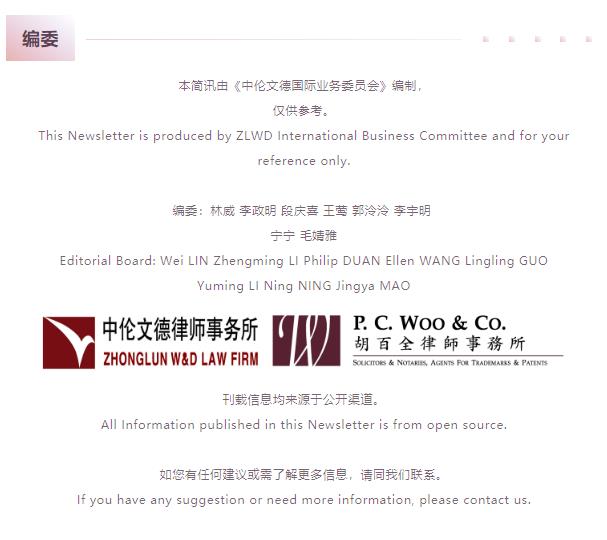
NEWS

NEWS
以下文章来源于中伦文德律师事务所 ,作者ZLWD

The Republic of Suriname Acceded to the New York Convention, Becoming the 171st State Party
According to information released by the UNITED NATIONS INFORMATION SERVICE (UNIS) on November 23, the Republic of Suriname officially acceded to the Convention on the Recognition and Enforcement of Foreign Arbitral Awards (the New York Convention) on 10 November 2022, becoming the 171st state party to the New York Convention.
The New York Convention will enter into force for Suriname on 8 February 2023.
The Second Shanghai Intermediate People's Court Issued a White Paper on the Enforcement of Arbitration Disputes from 2017 to 2021
On November 15, 2022, the Shanghai Second Intermediate People's Court (hereinafter referred to as the "Court") issued the "White Paper on the Enforcement of Arbitration Disputes from 2017 to 2021" (hereinafter referred to as the "White Paper"). According to the White Paper, from 2017 to 2021, the Court received a total of 4,387 cases regarding the enforcement of arbitration awards(the “Cases”), and the following characteristics of the above-mentioned cases received in the past five years are shown:
I. The number of the Cases received by the Court has shown a rapid trend of growth: the number of the Cases received has increased year by year, accounting for more than 50% of the number of newly received first enforcement cases in four of the last five years, with a relatively high increase in the rate;
II. Since 2017 to 2021, the termination 【The termination rate of the Cases refers to the proportion of the cases in which the enforcement cases are concluded by terminating the present enforcement procedure and by terminating the case in the total number of the cases concluded for initial enforcement.】rate of the Cases has increased year by year, the termination rate of the Cases heard by the Court is 76.6%. Among the terminated enforcement cases, the percentage of cases without property available for execution is relatively high;
III. The situations of the subject matter of the enforcement: nearly half of the property enforcement cases have a subject matter of less than CNY 100,000; the number of conduct enforcement cases is relatively small but the types of the conduct are abundant;
IV. The causes of the Cases are relatively concentrated, and the private lending arbitration award enforcement cases involving online platforms account for a high proportion;
V. Batch-type arbitration award enforcement cases emerged one after another, with nearly two-thirds of the executors of the above-mentioned cases being private enterprises;
VI. The number of cases applying for the enforcement of online arbitration awards has been increasing with each passing year.
The General Administration of Sports of China Published the Organizational Rules of the China Sports Arbitration Commission (Draft for Comments) and Sports Arbitration Rules (Draft for Comments)
On November 1, 2022, the General Administration of Sports of China (hereinafter referred to as “GAS”) has publicly solicited opinions on the Organizational Rules of the China Sports Arbitration Commission (Draft for Comments) and Sports Arbitration Rules (Draft for Comments).
According to the Organizational Rules of the China Sports Arbitration Commission (Draft for Public Comments), the China Sports Arbitration Commission (hereinafter referred to as “CSAC”) is an arbitration institution established by GAS in accordance with the law in handling sports disputes, and the duties of the CSAC according to the law include: formulating and amending the constitution; appointing and dismissing arbitrators; accepting sports disputes; supervising arbitration activities; and formulating the internal management methods of the CSAC. The China Sports Arbitration Tribunal will undertake the daily work of the CSAC.
The Sports Arbitration Rules (Draft for Comments) stipulate that the scope of cases to be accepted by the CSAC includes: i. disputes arising from appeal against decisions of disqualification, cancellation of competition results or bans made by the social sports organizations, the administrative units of athletes and the organizers of sports events in accordance with the regulations on doping control or other administrative regulations; ii. disputes arising from athlete registration and communication; and iii. other disputes arising from competitive sports activities.
Beijing Fourth Intermediate People's Court:
"Jointly Agreed Domestic Arbitration Commission" Did not Clarify the Specific Arbitration Commission, therefore the Arbitration Clause shall be Invalid
Legal Basis:
Arbitration Law of the People’s Republic of China
Article 16:
An arbitration agreement shall include arbitral clauses stipulated in the contract and other written agreements which request arbitration to be made prior to or following the occurrence of a dispute.
An arbitration agreement shall include the following:
(i) the expression of an application for arbitration;
(ii) items for arbitration;
(iii) the chosen arbitration commission.
Article 18:
Where an arbitration agreement has not specified or has not specified clearly items for arbitration or the choice of an arbitration commission, the parties concerned may conclude a supplementary agreement. If a supplementary agreement cannot be reached, the arbitration agreement shall be void.
Case Description:
Beijing Shihuan Jietian Energy Technology Development Co., Ltd. (hereinafter referred to as the "Shihuan Company") and Shenzhen Mopon Information System Co., Ltd. (hereinafter referred to as "Mopon Company") signed the "Contract for the Supply of 1-10 t/h Gas Steam Boiler" ( hereinafter referred to as "Steam Boiler Contract"), of which Shihuan Company agreeing to purchase 1-10 t/h of gas-fired steam boilers from Mopon Company on July 14, 2003; on the same day, the two parties signed another "Contract for the Supply of 0.7-1.4 MW Gas-fired Hot Water Boilers" (hereinafter referred to as the "Hot Water Boiler Contract", the Steam Boiler Contract and the Hot Water Boiler Contract are collectivley referred to as the “Contracts”), which agreed that Shihuan Company purchased 0.7-1.4 MW gas-fired hot water boilers from Mopon Company. Since Mopon Company failed to deliver the boilers as agreed in these two contracts, a dispute arose between the two parties, and Shihuan Company brought Mopon Company to Beijing Fourth Intermediate People’s Court (hereinafter referred to as the “Court”), requesting the Court to confirm that the arbitration clause under the two contracts was invalid.
The Court found that: On July 14, 2003, the Contracts signed by Shihuan Company and Mopon Company agreed that Mopon Company was the supplier, China International Tendering Co., Ltd. was the buyer, and it conducted the bidding for specific goods and auxiliary services on behalf of the project owner, Shihuan Company, which includes the agreement, general contract terms, special contract terms, etc.
Article 18 of the special contract terms stipulates that "All disputes arising from or in connection with the performance of this contract shall be amicably settled by the parties. If the dispute is not resolved within sixty (60) days of the commencement of such negotiations, the dispute shall be submitted to arbitration. In case of any dispute involving the buyer and the domestic supplier, arbitration shall be carried out by a mutually agreed domestic arbitration commission in accordance with such rules and procedures. In case of any dispute involving the buyer and the foreign supplier, i.e. formal arbitration under paragraph 18.1, arbitration shall be referred to the China International Economic and Trade Arbitration Commission (CIETAC) for arbitration in accordance with its arbitration rules/procedures in Beijing or elsewhere in China, unless the supplier has requested arbitration under UNCITRAL at the time of bidding, and unless otherwise agreed by the parties, the official language of arbitration shall be English. The arbitral award shall be final and binding on both parties."
It was also found that Mopon Company is a Chinese corporate legal entity.
Court’s View:
In this case, article 18 of the Special Contract Terms annexed to the Contracts agreed on dispute resolution. As a domestic supplier, Mopon Company should apply the clause which states that "in case of any dispute involving the buyer and the domestic supplier, arbitration shall be carried out by a mutually agreed domestic arbitration commission in accordance with such rules and procedures". The arbitration clause involved in this case was obviously unclear about the arbitration commission, and Shihuan Company indicated that it could not reach a supplementary agreement on the selection of the arbitration commission with Mopon Company, so the arbitration clause in the Contracts was invalid.
In accordance with the Provisions of the Supreme People's Court on Issues Concerning the Reporting of Cases Involving Judicial Review of Arbitration for Examination and Approval, the Court reported to the Beijing Supreme People's Court the opinion that the arbitration clause in dispute was invalid. The Beijing Supreme People's Court made the opinion that the arbitration clause of the case is invalid after its examination .
In conclusion, the Court supported the application of Shihuan Company and ruled that the arbitration clause agreed in article 18 of the Special Contract Terms in the Contracts signed between Shihuan Company and Mopon Company is invalid.
United States District Court for the Eastern District of New York:
ICSID Arbitration Tribunal Does not Belong to a Foreign or International Tribunal
Case Description:
Alpene is a company incorporated in Hong Kong. In June 2021, Alpene filed an application for arbitration with ICSID on the grounds that Maltese officials had taken wrongful action to expropriate its investment, Pilatus Bank of Malta, which was in violation of the Agreement between the Government of the People's Republic of China and the Government of Malta on the Promotion and Protection of Investments (hereinafter referred to as the "BIT"). On August 30, 2021, Alpene filed an application in the United States Court for the Eastern District of New York (hereinafter referred to as the “Court”) pursuant to Article 1782 of the United States Code (hereinafter referred to as "Article 1782")【Article 1782 (a) of United States Code :The district court of the district in which a person resides or is found may order him to give his testimony or statement or to produce a document or other thing for use in a proceeding in a foreign or international tribunal, including criminal investigations conducted before formal accusation. The order may be made pursuant to a letter rogatory issued, or request made, by a foreign or international tribunal or upon the application of any interested person.】, requesting a decision authorizing it to issue a subpoena for the submission of documents and testimony against a United States citizen, Elizabeth McCaul. On September 20, 2021, the Court granted the application. McCaul then filed a motion to vacate that decision with the Court on November 11, 2021. The Court suspended the case in light of the U.S. Supreme Court's(hereinafter referred to as the “Supreme Court”) certiorari decision in the AlixPartners case dated December 10, 2021, and the outcome of which will affect the outcome of this case.
The issue in this case is whether the ICSID tribunal constitutes a "foreign or international tribunal" under Article 1782.
Court’s View:
The Court noted that the Supreme Court did not give any applicable standards or guidance in the AlixPartners case, but the following persuasive factors must be considered: i. the applicable treaty does not reflect the intent of Russia and Lithuania to have the ad hoc tribunal exercise governmental power; ii. the ad hoc tribunal acts independently and is not affiliated with Lithuania or Russia; iii. the tribunal is composed of individuals chosen by the parties and does not have any official affiliation with Lithuania, Russia, or any other government or intergovernmental entity; iv. the arbitral tribunal does not receive a government grant and the parties are responsible for paying the costs of the arbitration; and v. the arbitration proceedings are confidential.
Pursuant to Article 9(2) of the BIT, if the dispute cannot be settled by negotiation within six months from the date of the written notice of dispute, the dispute shall, at the option of the investor, be submitted to: i. a court of competent jurisdiction of the contracting party that is a party to the dispute; ii. the International Centre for Settlement of Investment Disputes (ICSID) under the Convention on the Settlement of Disputes Between States and Nationals of Other States, signed at Washington on March 18, 1965; iii. an ad hoc international arbitration according to the Arbitration Rules of the United Nations Commission on International Trade Law. In other words, in accordance with the BIT, referring a dispute to ICSID is one of the options for investors to resolve their disputes. As stated in the AlixPartners case by the Supreme Court , "adding the court to the list of options" reflects Malta's and China's " intention to give investors the option to submit disputes to an existing governmental body" or "bodies set up to adjudicate investor-state disputes". Which is to say, the inclusion of domestic courts as one of the options of dispute resolution significantly undermines the defense that the tribunal has the power to exercise governmental power. The Supreme Court noted, however, that the possibility of a sovereign state granting official power to such an arbitral tribunal could not be ruled out.
ICSID is an independent, self-limiting system. Similar to the ad hoc tribunal in the AlixPartners case, the applicable treaty itself does not create an ICSID tribunal. Nor is it clear from the applicable treaty whether the parties intended to give the ICSID tribunal governmental power. In fact, the legal framework of the ICSID Convention creates a permanent institution and provides that the arbitral awards it makes have the status of final judgments and are binding on all member states under public international law. However, the fact that the courts are responsible for enforcing arbitration agreements and arbitral awards does not confer "governmental power" on the arbitral tribunal.
The primary purpose of Article 1782 is comity to foreign and international governmental agencies and is intended to promote assistance and cooperation between the United States and other nations. Accordingly, the issue that the court shall resolve in this case was: does ICSID exercise governmental power to grant an ICSID arbitrated party's request for evidence that would "promote respect for foreign governments and encourage mutual assistance"? Under the analysis of theSupreme Court, it was difficult for the Court to agree that such a situation exists in this case. ICSID (including investor-state arbitration in general) was not in existence when the United States amended Article 1782 to include "foreign or international tribunals" in 1964. Moreover, it was clear that ICSID tribunals are not authorized to provide reciprocal investigative and evidentiary assistance to United States judicial proceedings.
Finally, the Court noted that, no federal court had ruled on whether an ICSID tribunal was an international tribunal since the AlixPartners decision. It is worth noting, however, that prior to AlixPartners case, federal courts had unanimously held that the requests for investigation and evidence collection under Article 1782 applied to investor-state arbitration. Although the Supreme Court did not specifically discuss on the ICSID investor-state arbitration, by certiorariing two cases, including AlixPartners, the Supreme Court sent a clear signal of its intent to limit the application of investigation and evidence collection procedures under Article 1782 in international commercial arbitration.
In conclusion, the Court found that the evidence was insufficient to prove that Malta and China intended to grant governmental power to the ICSID tribunal. Therefore, the ICSID tribunal is not a "foreign or international tribunal" under Article 1782. Accordingly, the Court granted McCaul's motion to dismiss and denied Alpene's request for invetigation and evidence collection.


